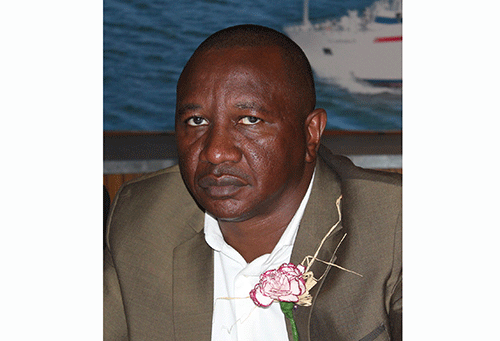WALVIS BAY – The chairperson of the Confederation of Namibian Fishing Associations Matti Amukwa has questioned the Environmental Social Impact Assessment (ESIA) report that was submitted last week by Namibia Marine Phosphate to the environmental commissioner, saying it is dubious.
Amukwa, who was speaking at the annual fishing industry stakeholders’ meeting which took place on Friday in Walvis Bay, is now calling for an independent study on the co-existence of phosphate mining along with fishing activities before government pronounces itself on the issue.
“The ESIA is biased and based on the same weak and superficial findings of the previous studies, and was just slightly adjusted,” he said.
The ESIA report, carried out by the Environmental Compliance Consultancy (ECC), stated that the fishing industry will be able to co-exist with phosphate mining.
According to the report, various mitigation measures are, however, needed to ensure a smooth transition and interaction between the industries and should have been incorporated into the Environmental Management Plan of the proposed projects.
The 276-page report that was made available to the public also stated that no adverse impacts remain high after mitigation and, therefore, all assessed impacts are within acceptable limits and can be managed effectively.
However, Amukwa on Friday said the possibility of marine phosphate mining in shallow waters close to the 200m contour line and the nursery areas for hake, monk and horse mackerel again looms on the horizon and is a real threat.
“Scientists around the world are cautioning that there is no sufficient scientific information available to say that marine mining is not harmful,” he added.
According to him, the studies produced for Namibia Marine Phosphate (NMP) were carried out by scientists paid for by the mining company. Hence, an independent study needs to be carried out as the rest of the world’s opinion on the issue is not positive.
Amukwa reiterated that the fishing industry employs 15 478 people directly, while one job in the fishing sector supports 3.8 jobs in other sectors of the Namibian economy.
“This means that 74 293 people are dependent one way or the other on jobs provided by the fishing industry, and 298 000 people or 11.9% of the Namibian population are directly and indirectly dependent for their income on the fishing sector,” he stressed.
The chairperson further said NMP had in its initial Scoping Report on the land-based operations set out that it will mine 5 million tonnes of phosphate-bearing sands to produce three million tonnes of commercial phosphate, utilising only 135 people.
“It is evident that no mining for marine phosphate should take place before independent, hard, scientific evidence is produced. The fishing industry, directly and indirectly, contributes N$66.2 billion to the Namibian GD,P and is too important for us to allow Namibia to be the test case to see whether marine mining is potentially harmful to fishing or not,” Amukwa stated.
The ESIA report
The report states that a full and comprehensive environmental and social impact assessment has been undertaken for the marine phosphate project. Potential impacts and aspects have been considered in the assessment, and thoroughly investigated against planned activities.
It further outlines that two post-mitigation impacts were recorded as moderate impacts which are socio-economic impacts on the fishing industry and marine environment impacts due to seabed dredging removal of the upper surface of the sediment, resulting in loss of benthic communities.
“Mitigation for seabed removal includes leaving behind a residual sediment layer (30 cm) and leaving undredged corridors adjacent to the dredged areas. The proposed project may contribute towards some cumulative impacts, both beneficial and adverse. The majority of impacts are recorded as low, and two impacts are recorded as minor. Therefore, the proposed project in a wider context, both temporally and spatially, is unlikely to contribute significantly to cumulative impacts. Therefore, the contribution is marginal, compared to overall activities within the Namibian Exclusive Economic Zone,” reads the report.
Photo: Amukwa
Caption:


